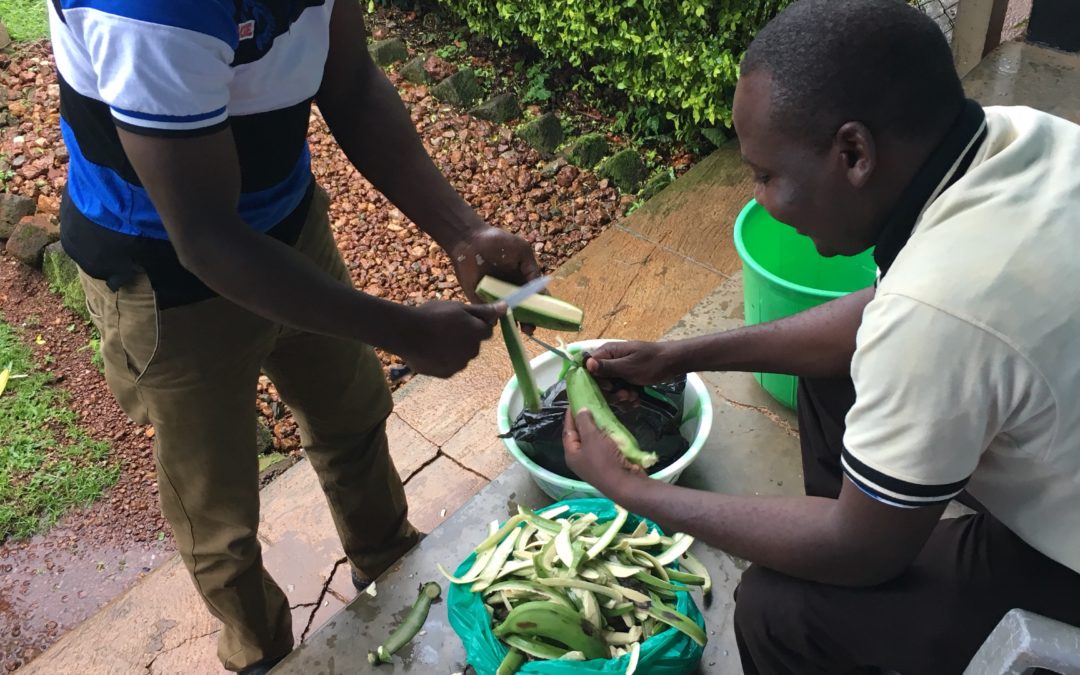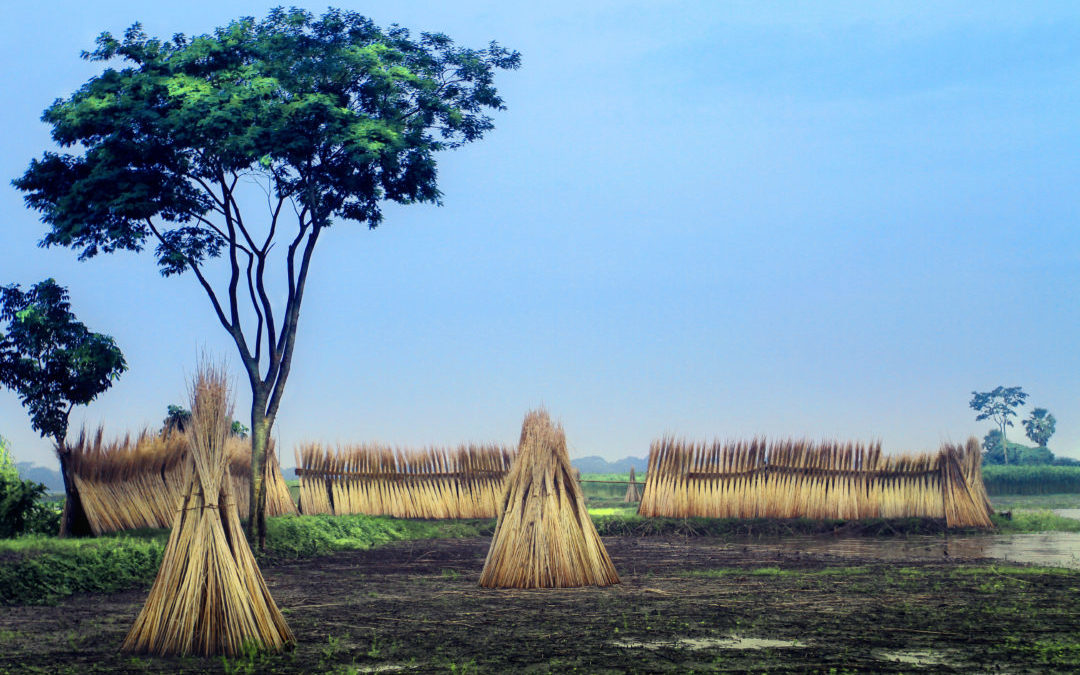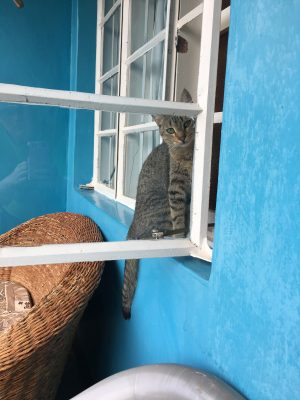by Jessica Hughes | Jun 7, 2018 | Uganda
In the last year, students have offered to get me a cat to try to fill Meri’s void. I have always declined, as I was either mourning or enjoying the concept of not being held down by a pet.
Apparently, the Lord thought it was time to fill the void.
In between rains on Monday, a canine peeped into my home office window and said hello. I thought he might be a friend’s dog, so I went out to see whether he was hurt. It wasn’t her dog, but this dog joyously jumped on me to say hello. And then he tried to come inside.
Local dogs generally are not terribly friendly, and tend to shy away from people. But not this boy. He made himself home on the verandah. Since he was so comfortable with me, I thought he had a family. I posted about him on Facebook, on Tuesday, hoping to find his family, but my friends told me that it seemed that I was chosen.
Sweet puppy kept coming around, and seemed to enjoy escorting me to chapel. So I caved, and admitted that I was adopted. Meet Tucker.

A SAMS Bridger here, also named Jessica, named him. Tucker is appropriate, as I lecture in the Bishop Tucker School of Divinity and Theology. And he wears it well. I heard that he joined the Sunday School children on stage in church on Sunday, so it’s appropriate that he’s named after Bishop Tucker.

My students are amused with my morning escort, though they’re less amused that he parked himself in the doorway this morning, as dogs are usually security, and they are leery of maneuvering around him, despite my assurance of their safety.


I’m amazed at how quickly I’ve taken to Tucker. It’s quite a comfort to see him sitting on the verandah. I’m not about to confess how many times I’ve asked him “who’s a good boy?!” I’m a cat person. I told him this. He wasn’t impressed.
I have no idea why God brought Tucker into my life. I’m sure this sweet puppy with the crazy ears has a lot to teach me.
Related

by Jessica Hughes | Apr 11, 2018 | Uganda
Over the last couple years, my discipleship group has become accustomed to an end of semester party. When we were studying the 39 Articles, we dubbed it the 40th Article. This semester, we studied spiritual disciplines, so we called it the Discipline of Fellowship.
Brian and Saul wanted to make matooke, the staple food for the Baganda, and fish. All I had to do was provide the kitchen and tea after. Sounds like a win! I had no idea how matooke was made, and was very interested to learn.
Brian brought over the matooke, fish, and spices (vegetables to make the sauce: tomatoes, onions, and green pepper). Then he started peeling the matooke. My knives have never had such a workout. Saul came and joined in the work, and soon enough, they were done.
Brian moved to the kitchen and began to work on the fish and sauce, while Saul continued with the matooke. He had retrieved some banana leaves and banana bark, and he placed the latter in a bowl crosswise, then a few banana leaves. Then he added the matooke. I was convinced it would never fit, but he proved me wrong. He then added more leaves, then tied it all tightly with the bark.


Saul then cut the spines of the banana leaves and some of the trunk so that the matooke wouldn’t touch the bottom of the pan. He added water, and voila! A matooke steam bath was born.

Now the matooke (in the pan we borrowed from the guest house because I don’t have a pan large enough) went in the stove to steam away. It eventually received another bowl as topper to trap the steam.

Brian continued to work on the fish and sauce, kicking me out of my own kitchen when I tried to help. Twice.



When the matooke had steamed enough (they kept pressing the leaves to see how soft it was), they removed it from the sauce pan, then took other leaves and mashed (though I think the proper term is “pressed”) it, working quickly because it was hot. Then it got re-wrapped for more steaming.


When it was finished, Saul then used a plate to scoop and serve, and we all enjoyed tremendously.



And out of that huge bunch of matooke (which fed 18 people) only this remained, which I gave to Saul.

Thanks be to God!
Related

by Jessica Hughes | Feb 27, 2018 | Uganda
I love the digressions our class discussions can take. While discussing the Holiness Code in Leviticus 17-27 with my Masters of Divinity students, we were discussing what was meant in Leviticus 18:8, and how it differs from Leviticus 18:7. This led to a small discussion on various marriage customs in Uganda, particularly with regard to giving another girl in the marriage to help at home.
How “help” is defined in this situation is still a bit fuzzy to me, as the discussion devolved a wee bit as students from different tribes took exception to how others were defining it. One student raised his voice, and began, “Now, Reverend, I am a Muganda, and we – ” to which I replied, “I am also a Muganda, though adopted.”
Apparently this was enough to derail the discussion, because someone asked what my Luganda name is. I have two: I was given Nakalema years ago, and last semester, a student gave me Nasuuna. So I explained this. The class was quiet as they digested this, and I leaned over to a Rwandan student who was sitting in the front row and whispered, “This means that I’m a princess.” He looked at me with some skepticism.
However, this was confirmed when one of the Baganda said, “Those are royal names.” Indeed they are; names must be appropriate for the clan to which you belong. And since I belong to one of the royal clans (Lion), I can have a royal name. Amen.
I explained that I’ve been given names from several areas in East Africa, which I wear as badges of honor. From the Luo in Kenya, I am Achieng (born at midday). One of the Kenyan students in class was delighted to hear this, and said he will call me this from now on. The Bunyoro give pet names, and one of our professors named me Abwooli (clean, or cat), and one of the Munyoro students has already adopted it. From the Muyankole, I am Mbabazi (Grace).
And all this from a discussion of the Holiness Code.
Related

by Jessica Hughes | Apr 29, 2017 | Uganda
On April 4, my sweet Meri died. I started this post a couple weeks ago, but it’s been hard to write; I think that writing it for the interwebs makes it a bit too real.
I am struggling with a bit guilt over this; she wanted breakfast at 2:00 am, and since there is no universe in which that was going to happen, I put her outside. She never came back. I found her nearby while on my way to chapel that morning, and spent the service trying to alternately hold back and wipe away tears. The current theory is that she found poison that had been put out for the feral dogs, and I can’t help but wonder whether if I’d fed her this could have been averted.
The Dennisons, from whom I inherited Meri, have been incredibly gracious and have absolved me of any guilt. They pointed out that Meri had likely far exceeded her nine lives even before she came to stay with me. Let’s remember that this is the kitty who would play with monkeys. Sigh.

I am missing my Guardian of the Galaxy (or at least the Honors College). I miss seeing her sitting on the final set of steps as I climb to my flat. I miss seeing her on the verandah. I miss hearing the girls next door greet her as they come and go. I miss having someone to talk to, even if she woke me at horrific hours.

Ugandans tend to be very pragmatic about death, especially about animals, as they tend to be more house workers rather than pets. But a few students have by and asked have where Meri was, and when I told them she was with Jesus, they were very sad. Their sympathy and empathy touched me deeply.
Meri was therapy for me when the Dennisons left; not only did I have a small reminder of them, having someone to talk to and care for gave me something to focus on. Even though I could never teach her to tell time, she was very bright: I’d tell her “let’s go,” or “time for chapel,” or “time for lectures,” and she’d head for the door. Well, unless she was feeling teenager-ish, and then she’d whine and we’d fight to get out the door.
She was a gift, and I’m grateful for the two years I had with her.
Related
by Jessica Hughes | Apr 19, 2017 | Uganda
Since yesterday afternoon, I have been serenaded by the happy sounds of heavy machinery beeping as it backs up, and motors grinding as the machines work. Yesterday, we begin to tarmac [pave] the campus, and it was a glorious day. Of course, students writing their exams may not have liked the noise, but it was music to my ears.
Our beautiful campus still has marram [dirt] roads, which aside from being dusty, are slippery when very dry, and are also slippery when wet. The hill going down to the Bishop Tucker building is on a steep incline, and that hill and I are not friends (in either direction, but especially down). Walking at night is always an adventure, as marram roads are always uneven, but their landscape changes daily, particularly in the rainy season (such as we are in now).
But now, the initial phase of tarmacking the campus has begun, and since this involves the roads I use most frequently, I am ecstatic. In addition to increased safety and reducing the dust that floats into the main library each day (and hurts the books), I’m hoping that this facelift will give UCU a much-needed aesthetic boost among potential students. As one friend commented, no one wants to enter the main gate then feel like they’re back in the village on marram roads.

Of course, we commissioned the work before it began, with the Vice Chancellor even firing up the grading vehicle and driving it a few inches. Quite a crowd gathered to commission and pray for this work that we are all terribly excited to see come to fruition.

As a Church of Uganda university, we receive no funds from the Ugandan government, and must fund this work ourselves. Would you be willing to prayerfully consider contributing to this effort? It is not easy to raise funds for capital projects, yet they are sorely needed. This project will cost about 800,000,000 (yes, eight hundred million) Ugandan shillings, or about $222,000 USD. In addition to beautifying the campus, you’ll be helping to make it safer to traverse, for which your favorite missionary in the Bishop Tucker School of Divinity and Theology would be most grateful.

The wonderful people at Uganda Partners will receive money for this and other projects for UCU, and they ensure that the money arrives here safely. If you would like to donate online, click the Donate link, choose the Multiplying Talents Fund (general fund), and in the Additional Comments field, note that the donation is for the tarmac/paving project. But please do take a look around the site; UCU most assuredly could not function as it does without the fundraising that Uganda Partners does.
God bless you.
Related

























